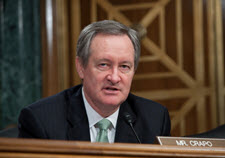The Senate on Wednesday passed (67-31) bipartisan Dodd-Frank reform legislation (S. 2155) that includes a Roundtable-supported measure to reform the Basel III High Volatility Commercial Real Estate (HVCRE) Rule, which would clarify specific requirements for acquisition, development, or construction (ADC) loans.
 |
The Senate bill , crafted by Banking Committee Chairman Mike Crapo, represents the most significant change to financial regulatory law since 2010. |
The HVCRE measure included in the Economic Growth, Regulatory Relief, and Consumer Protection Act originated in the U.S. House of Representatives as the Clarifying Commercial Real Estate Loans bill (H.R. 2148) – introduced by House Financial Services Committee members Rep. Robert Pittenger (R-NC) and Rep. David Scott (D-GA). An identical measure in the Senate – S. 2405 – co-sponsored by Senators Tom Cotton (R-AR) and Doug Jones (D-AL), was taken up in February by the Senate Banking Committee.
With S. 2405 included in the larger Senate bill, crucial clarifications to the HVCRE Rule now move forward to the House. The current, overly broad Rule would be modified by providing bank lenders with more specific requirements for acquisition, development, or construction (ADC) loans. These reforms to HVCRE loan definitions would provide greater assurances for performing loan portfolios with low risk, bolster credit capacity and preserve economically responsible commercial real estate lending. (Roundtable Weekly, Jan. 12).
HVCRE reform has been a top policy priority of The Real Estate Roundtable and its industry coalition partners, who have submitted numerous policy comment letters to policymakers since 2015. The Roundtable's HVCRE Working Group has also played a key role in advancing these specific reforms. (Roundtable letter, March 2)
The Senate bill, crafted by Banking Committee Chairman Mike Crapo, represents the most significant change to financial regulatory law since 2010. It raises the amount at which banks are considered "too big to fail" – from the current $50 billion threshold to $250 billion – while providing additional relief for community banks and credit unions.
 |
The Roundtable and twelve other real estate organizations recently sent a comment letter urging that the HVCRE measure (S. 2405) be included in the broader Dodd-Frank reform package (S. 2155). |
The bill also exempts banks with assets valued at less than $10 billion from the "Volcker Rule," which prohibits banking agencies from engaging in proprietary trading or entering into certain relationships with hedge funds and private-equity funds. Certain banks are also exempted from specified capital and leverage ratios, with federal banking agencies directed to develop new requirements.
Onward to the House
The Senate legislation faces significant challenges next week in the House, which passed the Financial CHOICE Act (H.R. 10) in June with more far-reaching revisions to Dodd-Frank.
House Financial Services Committee Chairman Jeb Hensarling (R-TX) has identified approximately 30 additional House bills he would like to see attached to the Senate deal, which could jeopardize the support of Senate moderates. (Bloomberg, March 15)
Hensarling yesterday said that House Speaker Paul Ryan (R-WI) promised that no action will be taken on the Senate's Dodd-Frank rollback until members from both chambers meet to negotiate. "It is a little presumptuous or naïve that the House would not expect to enter into a negotiation with the Senate," Hensarling said. "Some seem to be under the impression that we are going to vote on their bill." (BNA, March 15)
According to a White House statement immediately following passage of the Senate bill, "The President looks forward to discussing any further revisions the House is interested in making, with the goal of bipartisan, pro-growth Dodd-Frank relief reaching his desk as soon as possible."
Negotiations between House members, and between the two chambers, will begin in earnest next week, prior to the two-week Easter recess scheduled for the end of the month.